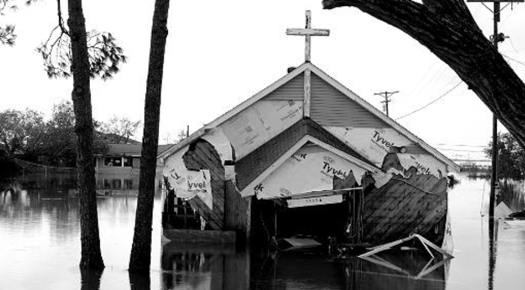
In August 2017 Hurricane Harvey hit Texas and three small Texas churches sued the Federal Emergency Management Agency (FEMA) over their ineligibility when applying for disaster relief grants. The churches said at the time that not allowing them to apply for disaster relief grants is unfair discrimination. “After the costliest and most devastating natural disaster in U.S. history, the government should come to the aid of all, not leave important parts of the community underwater,” said at the time Diana Verm, counsel at the Becket Fund. “Hurricane Harvey didn’t cherry-pick its victims; FEMA shouldn’t cherry-pick whom it helps.” But when three Texas churches affected by Hurricane Harvey sued FEMA over its previous policy, a U.S. district court denied the plaintiffs a preliminary injunction on the grounds that the federal agency was not obligated to fund repairs to religious spaces.
FEMA changed its rules and houses of worship can now receive federal aid after a disaster hits. FEMA’s new policy will retroactively cover damage reported as early as Aug. 23, 2017, which would include those houses of worship affected by Hurricane Harvey. Specifically, “private nonprofit houses of worship will not be singled out for disfavored treatment within the community centers subcategory,” Alex Amparo, FEMA’s assistant administrator for recovery, wrote in the manual’s foreword.
Before the change, churches and other houses of worship damaged in a disaster could receive FEMA grants if the funds were applied to schools, health care centers or other facilities not used primarily for religious purposes. FEMA didn’t want to give money to religious organizations to avoid any excessive entanglement between church and state.
Americans United for Separation of Church and State argued that ‘the prior FEMA policy was not controversial. FEMA offers grants to a limited set of nonprofit organizations to rebuild their structures. Only those organizations that are open to the public and that perform emergency, essential and government-like activities qualified. Houses of worship, like most nonprofits – including all of those used primarily for “political, athletic, recreational, vocational, or academic training, conferences, or similar activities” – were not eligible.’
A handful of houses of worship, however, want to get special treatment through taxpayer-funded grants. And now the new FEMA rules appear to permit that. These houses of worship may even ask taxpayers to pay for pulpits, Torah arks, prayer books, religious icons and more, the Americans United for Separation of Church states.
Interfaith Alliance also opposes FEMA policy change stating that even under these painful circumstances and motivated by compassion, the distribution of public funds through FEMA to any or all tax-exempt religious institutions is a mistake that trades a short-term benefit for long-term problems.
Photo Credits: Wikipedia
